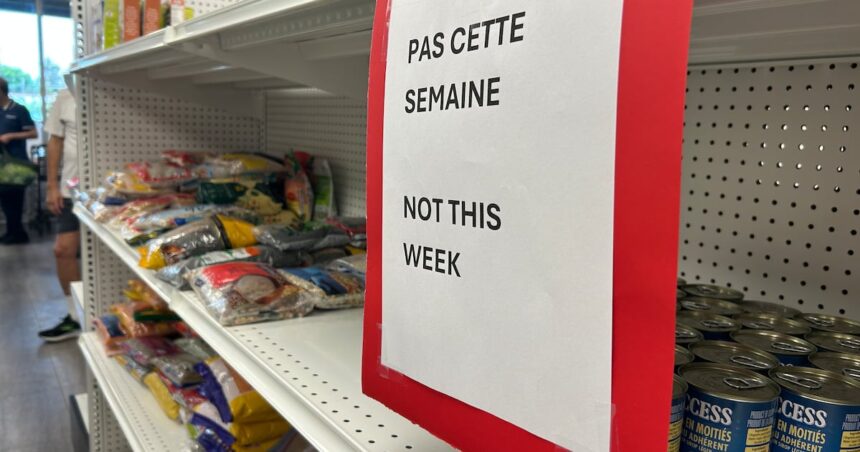The harsh fluorescent lights of Montreal’s food banks have become an all-too-familiar setting for thousands of new faces since the pandemic began. Behind each number in rising food insecurity statistics stands a person with a story—many who never imagined they’d need help putting food on their tables. This stark reality brought together over 200 stakeholders at Montreal’s first-ever Food Insecurity Summit this week, marking a watershed moment in Canada’s approach to hunger.
“We can no longer treat food insecurity as a charitable issue—it’s a public policy failure,” declared Lori-Ann Livingston, executive director of Montreal Community Food Coalition, as she opened the landmark gathering at the Palais des congrès. “When one in five Montreal children goes to school hungry, we’re not just talking about food—we’re talking about our collective future.”
The summit arrives at a critical juncture, with Food Banks Canada reporting record-breaking usage across the country. Quebec has seen a 33 percent increase in food bank visits since 2019, with nearly 40 percent of users being first-time recipients. These statistics reflect broader economic pressures hitting Canadian households from multiple directions.
Economists presenting at the summit pointed to a perfect storm of factors driving the crisis. “We’re witnessing the compounded effects of pandemic recovery, inflation, housing costs, and stagnant wages creating unprecedented pressure on household budgets,” explained Dr. Martine Beauchamp, economics professor at Université de Montréal. “For many families, food becomes the flexible budget item—the thing they sacrifice when rent increases.”
What distinguished this summit from typical conferences was its action-oriented approach. Rather than merely discussing the problem, breakout sessions focused on implementing concrete solutions across three streams: policy reform, community infrastructure, and economic interventions.
In the policy arena, participants developed a comprehensive platform calling for changes to Quebec’s social assistance programs, including indexing benefits to inflation and creating specialized nutrition supplements for vulnerable populations. “The math simply doesn’t add up when basic social assistance provides $800 monthly while average one-bedroom apartments in Montreal exceed $1,200,” noted social policy analyst Jean-Philippe Tremblay.
The summit also showcased innovative community models already showing promise. The Rosemont Food Security Corridor—a neighborhood-based system linking urban farms, processing facilities, and distribution hubs—demonstrated how localized food systems can increase resilience while creating jobs. “We’ve reduced food costs by 22 percent for participating households while creating 15 living-wage jobs,” reported project coordinator Sophia Chen.
Perhaps most striking was the presence of corporate leaders alongside traditional advocacy groups. Major grocers Loblaw, Metro, and Sobeys sent representatives who participated in uncomfortable but necessary conversations about pricing practices and food waste. “We acknowledge we must be part of the solution,” stated Claude Bergeron, regional director for Metro. “Today we’re announcing a commitment to redirect 100 percent of edible food waste to community partners by 2026.”
Indigenous perspectives played a central role throughout the proceedings. “Food sovereignty means reconnecting with traditional food systems that sustained our communities for thousands of years,” explained Mohawk elder William Deer in his keynote address. “These systems weren’t just about sustenance—they were about relationship with land and each other.”
The two-day summit concluded with the formation of a permanent Montreal Food Security Council comprising diverse stakeholders tasked with implementing the action plan developed during the gathering. The council will report quarterly on progress metrics and maintain momentum between annual summits.
“What we’ve started here represents a fundamental shift in how we address hunger,” summarized Mayor Valérie Plante in her closing remarks. “Montreal is committing to reducing food insecurity by 50 percent within five years through this comprehensive approach.”
As participants filed out of the convention center, many expressed cautious optimism about the path forward. “For the first time, I feel like we’re treating the disease, not just the symptoms,” reflected community organizer Ibrahim Hassan. “But the real test will be whether these commitments translate to fewer empty refrigerators in our neighborhoods.”
As our city embarks on this ambitious effort to ensure no Montrealer goes hungry, the question remains: can we truly build an equitable food system within an economic framework that continues to widen disparities, or does food security require us to reimagine our fundamental economic relationships?










